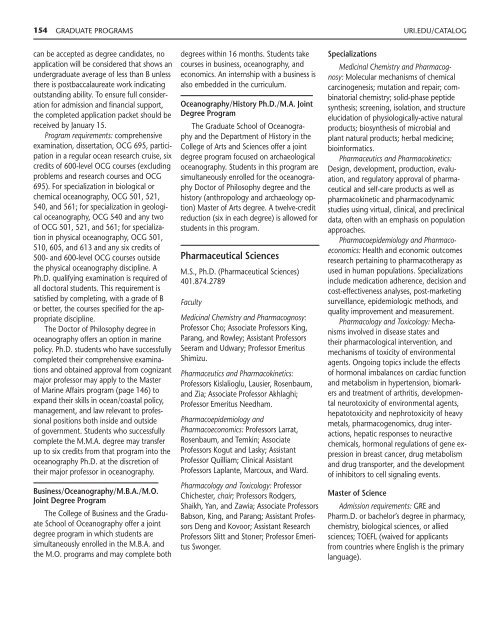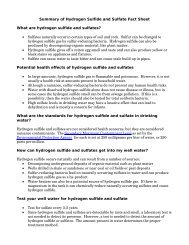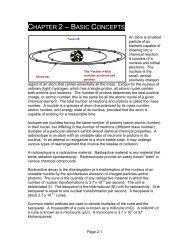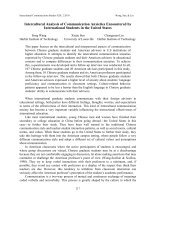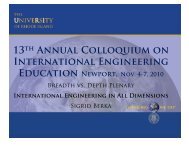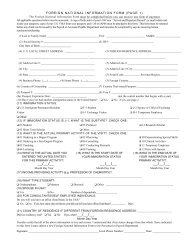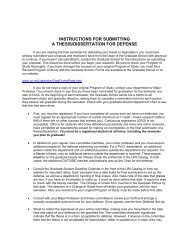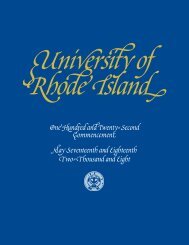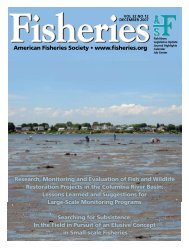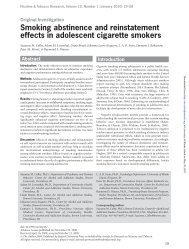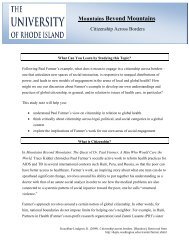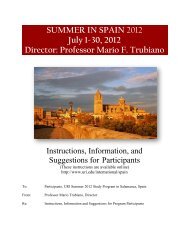UNDERGRADUATE PROGRAMS The - University of Rhode Island
UNDERGRADUATE PROGRAMS The - University of Rhode Island
UNDERGRADUATE PROGRAMS The - University of Rhode Island
You also want an ePaper? Increase the reach of your titles
YUMPU automatically turns print PDFs into web optimized ePapers that Google loves.
154 GRADUATE <strong>PROGRAMS</strong> URI.EDU/CATALOG<br />
can be accepted as degree candidates, no<br />
application will be considered that shows an<br />
undergraduate average <strong>of</strong> less than B unless<br />
there is postbaccalaureate work indicating<br />
outstanding ability. To ensure full consideration<br />
for admission and financial support,<br />
the completed application packet should be<br />
received by January 15.<br />
Program requirements: comprehensive<br />
examination, dissertation, OCG 695, participation<br />
in a regular ocean research cruise, six<br />
credits <strong>of</strong> 600-level OCG courses (excluding<br />
problems and research courses and OCG<br />
695). For specialization in biological or<br />
chemical oceanography, OCG 501, 521,<br />
540, and 561; for specialization in geological<br />
oceanography, OCG 540 and any two<br />
<strong>of</strong> OCG 501, 521, and 561; for specialization<br />
in physical oceanography, OCG 501,<br />
510, 605, and 613 and any six credits <strong>of</strong><br />
500- and 600-level OCG courses outside<br />
the physical oceanography discipline. A<br />
Ph.D. qualifying examination is required <strong>of</strong><br />
all doctoral students. This requirement is<br />
satisfied by completing, with a grade <strong>of</strong> B<br />
or better, the courses specified for the appropriate<br />
discipline.<br />
<strong>The</strong> Doctor <strong>of</strong> Philosophy degree in<br />
oceanography <strong>of</strong>fers an option in marine<br />
policy. Ph.D. students who have successfully<br />
completed their comprehensive examinations<br />
and obtained approval from cognizant<br />
major pr<strong>of</strong>essor may apply to the Master<br />
<strong>of</strong> Marine Affairs program (page 146) to<br />
expand their skills in ocean/coastal policy,<br />
management, and law relevant to pr<strong>of</strong>essional<br />
positions both inside and outside<br />
<strong>of</strong> government. Students who successfully<br />
complete the M.M.A. degree may transfer<br />
up to six credits from that program into the<br />
oceanography Ph.D. at the discretion <strong>of</strong><br />
their major pr<strong>of</strong>essor in oceanography.<br />
Business/Oceanography/M.B.A./M.O.<br />
Joint Degree Program<br />
<strong>The</strong> College <strong>of</strong> Business and the Graduate<br />
School <strong>of</strong> Oceanography <strong>of</strong>fer a joint<br />
degree program in which students are<br />
simultaneously enrolled in the M.B.A. and<br />
the M.O. programs and may complete both<br />
degrees within 16 months. Students take Specializations<br />
courses in business, oceanography, and<br />
economics. An internship with a business is<br />
also embedded in the curriculum.<br />
Medicinal Chemistry and Pharmacognosy:<br />
Molecular mechanisms <strong>of</strong> chemical<br />
carcinogenesis; mutation and repair; com-<br />
Oceanography/History Ph.D./M.A. Joint<br />
Degree Program<br />
<strong>The</strong> Graduate School <strong>of</strong> Oceanography<br />
and the Department <strong>of</strong> History in the<br />
College <strong>of</strong> Arts and Sciences <strong>of</strong>fer a joint<br />
degree program focused on archaeological<br />
oceanography. Students in this program are<br />
simultaneously enrolled for the oceanography<br />
Doctor <strong>of</strong> Philosophy degree and the<br />
history (anthropology and archaeology option)<br />
Master <strong>of</strong> Arts degree. A twelve-credit<br />
reduction (six in each degree) is allowed for<br />
students in this program.<br />
binatorial chemistry; solid-phase peptide<br />
synthesis; screening, isolation, and structure<br />
elucidation <strong>of</strong> physiologically-active natural<br />
products; biosynthesis <strong>of</strong> microbial and<br />
plant natural products; herbal medicine;<br />
bioinformatics.<br />
Pharmaceutics and Pharmacokinetics:<br />
Design, development, production, evaluation,<br />
and regulatory approval <strong>of</strong> pharmaceutical<br />
and self-care products as well as<br />
pharmacokinetic and pharmacodynamic<br />
studies using virtual, clinical, and preclinical<br />
data, <strong>of</strong>ten with an emphasis on population<br />
approaches.<br />
Pharmacoepidemiology and Pharmaco-<br />
Pharmaceutical Sciences<br />
economics: Health and economic outcomes<br />
research pertaining to pharmacotherapy as<br />
M.S., Ph.D. (Pharmaceutical Sciences) used in human populations. Specializations<br />
401.874.2789<br />
include medication adherence, decision and<br />
cost-effectiveness analyses, post-marketing<br />
Faculty<br />
surveillance, epidemiologic methods, and<br />
Medicinal Chemistry and Pharmacognosy:<br />
Pr<strong>of</strong>essor Cho; Associate Pr<strong>of</strong>essors King,<br />
Parang, and Rowley; Assistant Pr<strong>of</strong>essors<br />
Seeram and Udwary; Pr<strong>of</strong>essor Emeritus<br />
Shimizu.<br />
quality improvement and measurement.<br />
Pharmacology and Toxicology: Mechanisms<br />
involved in disease states and<br />
their pharmacological intervention, and<br />
mechanisms <strong>of</strong> toxicity <strong>of</strong> environmental<br />
agents. Ongoing topics include the effects<br />
Pharmaceutics and Pharmacokinetics: <strong>of</strong> hormonal imbalances on cardiac function<br />
Pr<strong>of</strong>essors Kislalioglu, Lausier, Rosenbaum, and metabolism in hypertension, biomark-<br />
and Zia; Associate Pr<strong>of</strong>essor Akhlaghi; ers and treatment <strong>of</strong> arthritis, developmen-<br />
Pr<strong>of</strong>essor Emeritus Needham.<br />
tal neurotoxicity <strong>of</strong> environmental agents,<br />
Pharmacoepidemiology and<br />
Pharmacoeconomics: Pr<strong>of</strong>essors Larrat,<br />
Rosenbaum, and Temkin; Associate<br />
Pr<strong>of</strong>essors Kogut and Lasky; Assistant<br />
Pr<strong>of</strong>essor Quilliam; Clinical Assistant<br />
Pr<strong>of</strong>essors Laplante, Marcoux, and Ward.<br />
hepatotoxicity and nephrotoxicity <strong>of</strong> heavy<br />
metals, pharmacogenomics, drug interactions,<br />
hepatic responses to neuractive<br />
chemicals, hormonal regulations <strong>of</strong> gene expression<br />
in breast cancer, drug metabolism<br />
and drug transporter, and the development<br />
<strong>of</strong> inhibitors to cell signaling events.<br />
Pharmacology and Toxicology: Pr<strong>of</strong>essor<br />
Chichester, chair; Pr<strong>of</strong>essors Rodgers, Master <strong>of</strong> Science<br />
Shaikh, Yan, and Zawia; Associate Pr<strong>of</strong>essors Admission requirements: GRE and<br />
Babson, King, and Parang; Assistant Pr<strong>of</strong>es- Pharm.D. or bachelor’s degree in pharmacy,<br />
sors Deng and Kovoor; Assistant Research chemistry, biological sciences, or allied<br />
Pr<strong>of</strong>essors Slitt and Stoner; Pr<strong>of</strong>essor Emeri- sciences; TOEFL (waived for applicants<br />
tus Swonger.<br />
from countries where English is the primary<br />
language).


